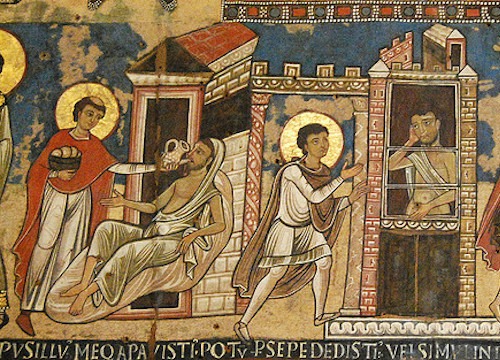We run our website the way we wished the whole internet worked: we provide high quality original content with no ads. We are funded solely by your direct support. Please consider supporting this project.

The Call to a Cruciform Life
Jesus repeatedly taught that following him meant that one had to be willing to “pick up their cross daily and follow [him]” (Lk 9:23; 14:27). Picking up our cross is the centerpiece of following Jesus because this was the centerpiece of what Jesus was all about. The thematic centrality of the cross is also illustrated in Jesus’ teaching that to be considered a “child of your Father in heaven,” one has to be willing to refuse to retaliate and instead “love your enemies and pray for those who persecute you” (Mt 5:44-5, cf., 38; Lk 6:27-35), for this is precisely the example that Jesus set when he refused to use his power to defend himself, choosing instead to die for his enemies rather than to crush them (Mt 26:51-3).
Along the same line, the cross is the thematic center of all of Jesus’ teachings that speak of the need for people to lose their life in order to find it (Mt 10:39; 16:25) and that associate greatness with humility, innocence and serving others (e.g., Mt 16:11-4; 23:11-2; Lk 18:15-7). In addition, Jesus takes the common understanding of power and turns it on its head by associating it with a willingness to sacrificially serve others (e.g., Mt 20:20-8).
The cross was not merely something God did for us; it was also an example God calls disciples to follow. It is thus significant that after defining the kind of love that characterizes God by pointing us to Jesus’ death on the cross, John immediately goes on to add: “And we ought to lay down our lives for one another“ (1 Jn 3:16, emphasis added). This and a number of similar passages make it evident that God’s will is for the cruciform love that defines his own, eternal, triune nature to transform us and flow through us to others.
In yesterday’s post, I briefly introduced Augustine’s subjective definition of love that enabled him, and multitudes of others that followed him, to claim that for God as well as God’s people, loving enemies does not necessarily rule out torturing and killing them. This definition is explicitly ruled out by the teachings of Jesus and Paul. Jesus commanded us not merely to love our enemies as an inner disposition, but to express this love by how we actually treat them. The love that Jesus teaches and models is both active and nonviolent.
We are specifically instructed to “bless,” “pray for,” “do good” to, “be merciful” toward, and to “lend to” our enemies “without expecting to get anything back” (Mt 5:44-45, Lk 6:28-29, 35). These are not inner dispositions: they are concrete behaviors! So too, we are taught to disobey the OT’s command to exact just retribution and to instead “not resist (antistemi) an evil doer” and to turn the other check when struck (Mt 5:38-9). These are obviously not merely instructions about how we should think or feel in response to enemies: they are instructions on how we are to actually behave in response to the hostile behavior of enemies!
The same holds true when Paul instructs us to “[b]less”—“not curse”—those who persecute us (Rom 12:14), and to never “repay evil for evil” (Rom 12:17). Specific behaviors are also implied when Paul instructs us to never “exact revenge” (12:19), but to instead “overcome evil with good” (12:21) by feeding enemies when they’re hungry and offering them something to drink when they are thirsty, for example (Rom 12:20). All of these passages expose the artificiality of Augustine’s fateful attempt to divorce the love we are commanded to live in from the commitment to non-violence that is entailed by this love.
There is not one exception clause to any of the NT’s instructions about loving enemies and, therefore, the refusal to resort to violence in response to them. To the contrary, the unqualified way Jesus speaks about enemies makes it clear that it includes every possible enemy who is threatening us for any possible reason. Moreover, far from allowing for “justified” exceptions, Jesus explicitly rules out any possible exceptions when he emphasized in as strong as terms as possible that his followers were to love indiscriminately—the way God loves and blesses the just and unjust by causing his sun to shine and his rain to fall on everyone, without any regard to whether the people we are called to love deserve it or not (Mt 5:45; Lk 6:35). The sun and rain do not pick and choose whom they will and will not fall on. Rather, the sun shines and the rain falls simply because it’s the sun’s nature to shine and it’s the nature of rain to fall.
Category: General
Tags: Cruciform Theology, Enemy Love, Kingdom Living
Topics: Following Jesus
Related Reading

The Cruciform Center Part 2: How John’s Gospel Reveals a Cruciform God
In the previous post, we looked at how the Synoptics illustrate the centrality of the cross. While the Gospel of John varies in its structure and language from the Synoptics, the cross remains at the center. This centrality is expressed in a number of different ways. 1. The role that Jesus’ death plays in glorifying…

What Does it Mean to be “Holy”?
Image by much0 via Flickr People today frequently associate the word “holy” with a list “do’s” and “don’ts” that “godly” people are supposed to adhere to. The concept of “holiness” in the Bible, however, is not primary about behavior. It rather refers to something that is unique and set apart from more common things. God is…

Kingdom Centeredness
A Silent Center white knuckles cling against peace and cries for release into chaos flying, centrifugal to death in attempt to salvage human breath for breathing, through peeling purge that burns away flesh to white bone singed and aching for skin new to inhale holy fire once again, until the timely scourge of…

The Cross Above All Else
The way to know what a person or people group really believes is not to ask them but to watch them. Christians frequently say, “It’s all about Jesus,” but our actions betray us. Judging by the amount of time, energy, and emotion that many put into fighting a multitude of battles, ranging from the defense…

Responding in Love
The world is full of conflict where evil begets more evil. Violence produces more violence. Arguments produce more arguments. It’s a tit-for-tat world. What is God’s strategy for stopping this conflict? How does God respond to evil, and how does God call us to respond? This strategy might even come in handy during heated conversations…

The Incarnation as an Example of Cross-Cultural Love
Beautiful Faces of Palestine via Compfight Christena Cleveland wrote an excellent piece about the radical cross-cultural nature of the incarnation. I’ve never thought of it quite this way before, but the incarnation is the most profound instance of entering into another culture in a selfless way. Moving outside of our “cultural comfort zone” to more…
